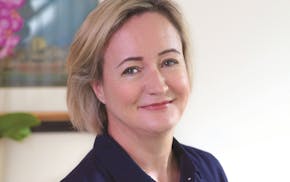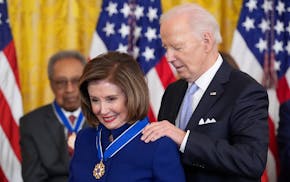When she walked into Wooddale Church for the first time, Joan Perry felt a bit anxious. Having grown up in a small town dominated by Lutherans, members of other denominations were: "How do I put this? They were the strange people."
But she "heard a message that I'd never heard before in my life, and I've never left," she said. And as for the church's denominational association, "I never gave that a thought."
Perry's story demonstrates the confluence of two religious trends. The Eden Prairie church does not belong to one denomination; it has joined two: The Baptist General Conference and the Conservative Congregational Christian Conference. And an increasing number of churchgoers don't care about their church's denomination; it's the church itself that matters.
Together, these two developments mark a major change in the way we think of ourselves and our religion, said the Rev. John Mayer, executive director of City Vision, a Minneapolis-based organization that tracks religious demographics.
"We used to identify ourselves by our denomination," he said. "I'd say, 'I'm a Lutheran.' And when I moved to a new town, I'd only look at Lutheran churches. Now we look for churches the other way around. Is it a good church? What does it do? What does it believe in? What denomination it belongs to is a secondary issue."
In February, the Pew Forum on Religion and Public Life released a survey that found that more than a fourth of adult Americans attend a church that has a different affiliation than the one in which they grew up. Mayer said that statistic didn't surprise him.
"The demographics are changing," he said. Joining a church of a different denomination from the one you grew up in "used to be considered strange. It's not anymore."
Churches reap several benefits from joining more than one denomination, said the Rev. Steve Triechler from Hope Community Church in Minneapolis, which belongs to the Baptist General Conference and the Evangelical Free Church of America.
"We can take advantage of programs being offered by both denominations," he said. "We started as a Baptist church, but then we realized that the Evangelical Free Church has a lot of great programs that the Baptists don't have, and the other way around."
He said that prospective new members rarely bring up the denomination issue -- "No one even asks anymore," he said -- but if they do, he tells them, "It's like having a two-for-one coupon."
There's also a control issue: "The traditional relationship with a denomination doesn't exist" when a church belongs to more than one, he said. "It's 'we join you' as opposed to 'you run us.' "
A matter of survival
Belonging to two denominations is what kept Cherokee Park United Church alive and now is helping it grow, said the Rev. Tim Johnson. The St. Paul church is the result of a merger between St. John's United Church of Christ and Cherokee Heights Presbyterian Church, and it maintains its connections with both denominations.
"We were two small congregations about a block apart that both were in danger of closing," Johnson said. "So we did it out of necessity, but we've come to realize that it's been very fortunate for us because it's consistent with this congregation. We want to open our doors to a wider spectrum of folks, and having our feet in both denominations helps us cast a wider net in terms of a welcome."
Johnson admitted that because of initial competition between members of the two denominations, "There were a couple of bumps in the road. But in the long run, it's been great."
Mayer said that sort of distrust is vanishing rapidly.
"In the old days, you identified yourself by what you weren't," he said. "There was fear of other denominations. But there's a new paradigm in which we define ourselves by the values we hold in common, and that has taken the fear out of it. The outsiders have become the insiders."
More to come
Mayer predicts that the trend has only begun. He surveys all the churches in the metro area at the end of each year. There are six multidenominational churches on his current list, but he expects to find more the next time he counts.
"I think we're going to see much more of this in the future," he said. "Once the innovators do it, others are less fearful of it. And denominations are starting to see this as a strength. They're not threatened by it."
For one thing, there can be a cost benefit. Consider United Theological Seminary in New Brighton. While its primary association is with United Church of Christ (UCC), it ordains ministers in more than 20 faiths, from Unitarian to Moravian. It's cheaper for those denominations to send their ministerial candidates to United than to run their own seminaries.
"There's an economy of size," he said. "It also makes it easier for churches to find ministers. Maybe they can't find one who comes from their exact religion, but they can find one who came out of the same seminary. We're seeing more of that, of Presbyterian churches hiring UCC ministers, for instance. And they're comfortable with it."
Another aspect of the multidenominational trend involves churches planting churches of different denominations. For instance, Wooddale has spun off Northwood Church in Maple Grove, which is Southern Baptist, and Bridgewood Church in Savage, which is affiliated with the Christian Reform Church. And North Heights Lutheran Church in Arden Hills and Roseville helped plant Emmanuel Covenant Church in Roseville.
"We're not as loyal to our denomination as before," Mayer said. "People are on more of a spiritual journey. Now it's more about building the kingdom of God than about building your own little fiefdom."
Jeff Strickler • 612-673-7392

Helen Simonson is in Jane Austen mode with 'The Hazelbourne Ladies Motorcycle and Flying Club'
New Orleans' own PJ Morton returns home to Jazz Fest with new music

Biden awards the Medal of Freedom to Nancy Pelosi, Medgar Evers, Michelle Yeoh and 15 others
![Mia's former associate curator of Native American Art Jill Ahlberg Yohe.
] ELIZABETH FLORES • liz.flores@startribune.com](https://arc.stimg.co/startribunemedia/KLM6KWE7YJDQRICKFBZ3QEYRPA.jpg?h=91&w=145&fit=crop&bg=999&crop=faces)
